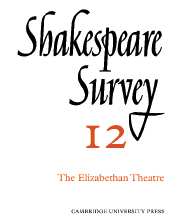Book contents
- Frontmatter
- The Open Stage: Elizabethan or Existentialist?
- The Lantern of Taste
- Was there a Typical Elizabethan Stage?
- On Reconstructing a Practicable Elizabethan Public Playhouse
- The Discovery-space in Shakespeare’s Globe
- ‘Passing over the Stage’
- The Actor at the Foot of Shakespeare’s Platform
- Elizabethan Stage-Practice and the Transmutation of Source Material by the Dramatists
- The Maddermarket Theatre and the Playing of Shakespeare
- Actors and Scholars: A View of Shakespeare in the Modern Theatre
- Cleopatra as Isis
- Shakespeare’s Friends: Hathaways and Burmans at Shottery
- Illustrations of Social Life II: A Butcher and some Social Pests
- International Notes
- Shakespeare Productions in the United Kingdom: 1957
- The Whirligig of Time, A Review of Recent Productions
- The Year's Contributions to Shakespearian Study 1 Critical Studies
- 2 Shakespeare’s Life, Times and Stage
- 3 Textual Studies
- Books Received
- Index
- Plate Section
Cleopatra as Isis
Published online by Cambridge University Press: 28 March 2007
- Frontmatter
- The Open Stage: Elizabethan or Existentialist?
- The Lantern of Taste
- Was there a Typical Elizabethan Stage?
- On Reconstructing a Practicable Elizabethan Public Playhouse
- The Discovery-space in Shakespeare’s Globe
- ‘Passing over the Stage’
- The Actor at the Foot of Shakespeare’s Platform
- Elizabethan Stage-Practice and the Transmutation of Source Material by the Dramatists
- The Maddermarket Theatre and the Playing of Shakespeare
- Actors and Scholars: A View of Shakespeare in the Modern Theatre
- Cleopatra as Isis
- Shakespeare’s Friends: Hathaways and Burmans at Shottery
- Illustrations of Social Life II: A Butcher and some Social Pests
- International Notes
- Shakespeare Productions in the United Kingdom: 1957
- The Whirligig of Time, A Review of Recent Productions
- The Year's Contributions to Shakespearian Study 1 Critical Studies
- 2 Shakespeare’s Life, Times and Stage
- 3 Textual Studies
- Books Received
- Index
- Plate Section
Summary
Cleopatra’s most striking qualities closely resemble those of the goddess Isis, and may have been suggested by her. Before I show the sources of Shakespeare’s knowledge of the cult of Isis, I must state the view of Cleopatra, and of her relationship with Antony, which suggests such an analogy.
The nature of Cleopatra's love stands in contrast to the Roman view of human relationships with which Antony accords. For Antony, the opposition of business and pleasure imposes a choice:
The business she hath broached in the state
Cannot endure my absence.
(i, ii, 172-3)And though I make this marriage for my peace,
I’ the east my pleasure lies.
(ii, iii, 39-40)The words 'business' and 'pleasure' are honest, and they mean no more than they say. It is folly to attempt, as Cleopatra does, to force on Antony's pleasure the interpretation of love. "If it be love indeed, tell me how much" (i, i, 14). The grandiose evasions of his reply do not deceive her. "Excellent falsehood!" is her assessment. It would have been folly had she believed him when he implied the priority of pleasure over business: "Let Rome in Tiber melt... .Here is my space." By the end of the act, he has gone to attend to business in Rome.
- Type
- Chapter
- Information
- Shakespeare Survey , pp. 88 - 94Publisher: Cambridge University PressPrint publication year: 1959
- 6
- Cited by

